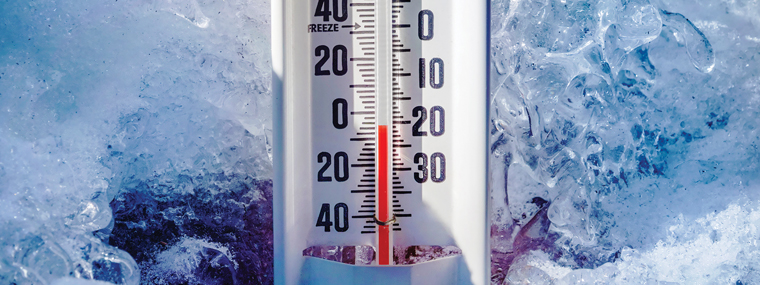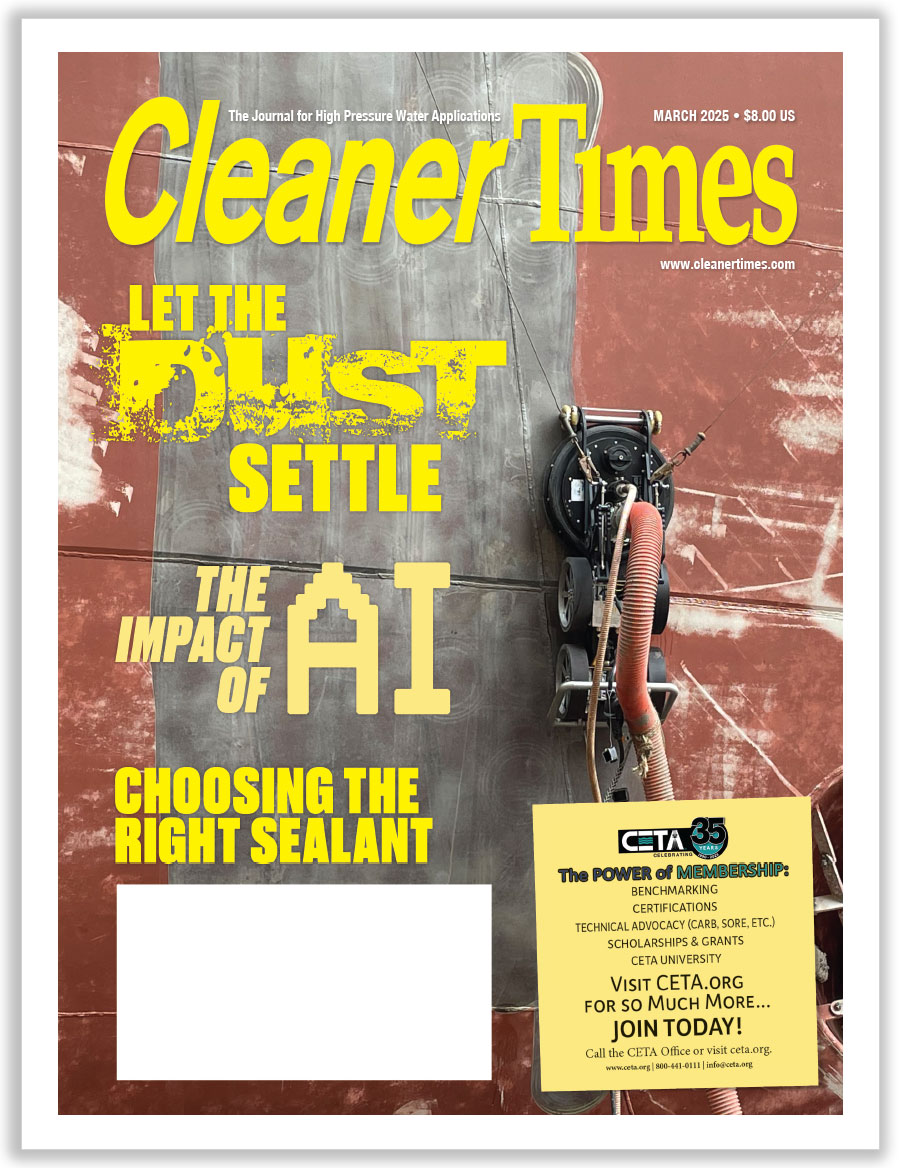
Hard Times for Water
Winter Cleaning
By Kathy Danforth / Published November 2018

Cold weather is more than just a feeling; that decrease in molecular movement that we register as a drop in temperature has physical effects on equipment, workers, and job processes.
When temperatures go below freezing, water will freeze and expand, which may crack any material that stands in the way. Jerry Meyer with Ben’s Cleaner Sales in Seattle, WA, advises, “If it’s below freezing, the best preventive maintenance is to run antifreeze through all the parts of a pressure washer. We used to use automotive antifreeze, which is fine if you recapture all of it, but now we recommend RV antifreeze because it is safer for the environment if some spills on the ground.”
The second-best method to prevent freezing and cracking in a machine exposed to freezing temperatures is to push air through the system, according to Meyer. “However, sometimes there can be a pocket of water that’s half full in the pipe, and the air blows right over without blowing it out,” Meyer cautions.
“If you use the machine daily, store it in a warm area to avoid having to employ the antifreeze procedure,” advises Meyer. “Your pump is most vulnerable to ice when it is not in use. To protect your pressure washer overnight and during the weekend while it is used on a regular basis, store the unit in a heated shed. Most of the equipment damage caused by cold temperatures happens when people fail to take unheated buildings into account. Someone may work all week but leave the washer outside over the weekend because it’s outside equipment, forgetting that it will be below freezing. It may be in a shed, but if it’s not heated, the washer will need to be rolled inside or have antifreeze.”
A few pointers Meyer adds: “Before storing your pressure washer, always disconnect the pressure hose and drain it. Hoses will expand when frozen and split the wire braid or can be blocked by ice putting excessive pressure on the pump when starting.”
McHenry Pressure Cleaning Systems in Frederick, MD, points out, “Just as you would protect your pressure washer, so too you should protect your chemicals from plunging temperatures. Liquid chemicals will separate if they freeze.”
Other equipment fluids can thicken and freeze with the colder temperatures. Meyer advises, “Add a fuel stabilizer to your gas, and run the engine for a couple of minutes to make sure all the carburetor parts and orifices contain treated fuel. Also, it is critical that you maintain the level and cleanliness of oil during winter to properly lubricate during colder weather.” As well as engine oil, pump oil, a different formulation, should be changed. “If you use engine oil in the pump, it will foam up, lose lubrication, and possibly cost you a new pump. Pump oil is a special non-detergent oil with a defoamer, corrosion inhibitor, and moisture inhibitor.
“Slow or inefficient performance is one of the most common pressure washer issues in low temperatures,” says Meyer. “Usually this change in performance stems from a problem with how the engine runs or a problem with the fluids. In cold weather, machines move more slowly and require more fuel. Sometimes there is more of a problem with the burner lighting, so the user may have to richen the fuel mixture. Diesel fuel may thicken, so it doesn’t atomize and light as well.”
Work can be done in the winter with some adjustments. “You don’t want the equipment to freeze up while you’re using it,” Meyer points out, “but people may not keep up with how fast the equipment is cooling down. With a wind chill, water in the equipment may freeze quicker while workers are moving hoses or items around.”
McHenry’s advises, “When you’re working in sub-zero temperatures, things freeze very quickly. To prevent your hoses from freezing, make sure you maintain a steady flow of water. Even if your hose touches the frozen ground, it can freeze almost instantly. Therefore, keep your machinery and water running for the duration of your project.”
It is also worth waiting until afternoon sun and warmth for outside work. McHenry’s notes, “It’s tempting to complete tasks like pressure washing first thing in the morning, but if you wait until after lunch, the sun can more effectively warm up the machinery and your vehicles. It will also help with the drying process. Waiting is safer and more efficient.”
McHenry’s also suggests, “If you have to pressure wash your vehicles outside, try to do so in bright sunlight. Direct light heats surfaces and makes them much easier and faster to clean. Ditch the shade and find a sunny spot.
“In the snow belt region of the United States, it is common for outdoor water sources to freeze. If this occurs, make sure you have access to indoor fittings, and always use properly sized garden hose extensions.”
When washing vehicles in colder weather, door locks and other openings may freeze up if water enters. “Use a bit of WD-40 or other lubricant to prime these areas before you start pressure washing,” advises McHenry’s. “Another good way to prevent doors and brake drums from freezing is to use hotter water. We recommend 100°–200°F. At this temperature, the water evaporation will reduce the chance of icing.”
Vehicles do require more consideration in freezing conditions. McHenry’s notes, “Don’t neglect to wash the underbody, wheel wells, and chassis of your vehicle. Salt, snow, and sand can collect under your machine and cause long-lasting damage. Be sure to direct the pressure washer underneath your vehicle to wash away grit, dirt, and salt.”
Where the water goes after it has done its job is an issue in itself. Meyer states, “Most contractors don’t do outside cleaning because of the slip and fall hazard created when the water freezes, but with diligent use of a deicer, it can be done.”
McHenry’s cautions, “For your safety and the safety of others, make sure you apply magnesium chloride or calcium chloride to melt the ice, but know that these treatments can leave behind an oily and slippery residue.” This can be a time to consider using a leaf blower to move excess water off a surface. McHenry’s advises, though, “It’s best to do this indoors, since outdoors it can increase the freezing rate of surface water.”
Chemical reaction rates are dependent on temperature, but Meyer explains, “The reaction rate doesn’t just vary proportionately with temperature. At 100° F compared to 50° F, the difference may be much more than just two times faster. With a hot water machine, there may not be much difference in cold weather. However, with cold water it may take more chemicals or a stronger version. You could use a longer time, but most guys want to work fast, so they’ll probably use a stronger dilution.”
And, of course, workers need to take care of themselves in the cold. “Because you’ll be in close contact with water in low temperatures, you run the risk of developing hypothermia,” observes Meyer. “Always wear full winter gear or insulated rain gear, including sturdy boots, a hat, and gloves, when operating the pressure washer. On windy days, always point your pressure washer downwind to avoid being misted while you work.”
Inadequate footwear can do more than give you cold feet. McHenry’s points out, “Even if you’ve deiced ahead of time, if you’re power washing outdoors, make sure you wear the proper footwear as you navigate across the ice and slush. Spiked shoes or even boot chains are a great choice. Pressure washers pack a lot of punch. The trigger spray force also could knock you off your feet. And water on top of ice makes it even more dangerous. Plant your feet and watch your step.”
Winter and cold weather are common, but the consequences of cold temperatures on man, machine, and water should not be minimized; the possible effect of any changes should be considered. The catastrophic explosion of the Challenger shuttle in 1986 was attributed to failure of a pressure seal, with loss of resiliency (brittleness) of an O-ring due to low temperatures as a crucial factor. Working safely in cold weather is not just a matter of toughing it out—plan wisely and keep track of all working conditions.





